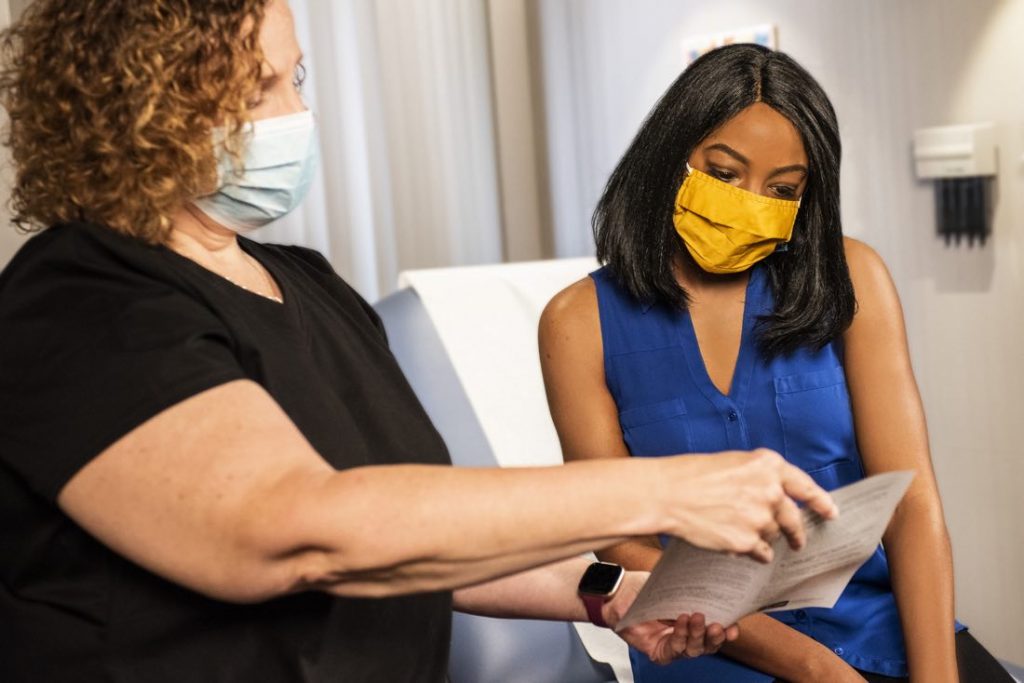 Like with everything COVID, nothing is definitive. It’s a moving target and employers are left making decisions with conflicting guidance. This is today’s reality.
Like with everything COVID, nothing is definitive. It’s a moving target and employers are left making decisions with conflicting guidance. This is today’s reality.
While some employees have returned to the office, there are many who are still working remotely. As cases of COVID-19 continue to decrease, companies are planning their return. The looming question: Can employers mandate a COVID-19 vaccine? The short answer is YES, but the situation is fluid and could change. There are nuances and circumstances that must be taken into consideration before making your final decision. Let’s look at the current guidance.
Equal Employment Opportunity Commission (EEOC) guidance on COVID-19 vaccine
According to EEOC, employers can lawfully require a COVID vaccine before employees can return to work. There are exceptions to this guidance. Be sure to document any communications when determining if a reasonable accommodation is needed and feasible.
- Disability considerations – If an employee’s disability interferes with getting the vaccine, then you may have to exempt them from the mandate. Some people have a history of allergic reactions to vaccine ingredients or taking the vaccine may be contraindicated by their doctor. An example of this would be pregnant or nursing moms. If an unvaccinated employee poses a “direct threat” to others that cannot be eliminated or reduced by a “reasonable accommodation” then you can require vaccination. Accommodations include working remotely or requiring masks, social distancing, and health checks in the office according to CDC requirements. Screening questions must be related to symptoms of COVID-19 and be kept confidential. As CDC recommendations evolve, you may need to reassess the direct threat. (See K.5. for evaluating a possible direct threat)
- Religious accommodations – If employees have a sincerely held religious belief, practice, or observance that conflict with vaccinations, then you may have to exempt them from the mandate. The belief must be grounded in religion to qualify. Like with the disability consideration, you must provide a “reasonable accommodation.” If you doubt their religious claim, you are justified in requesting extra information.
- ADA obligations – The Americans with Disabilities Act (ADA) restricts employers from asking employees for medical information. The EEOC clarified that the vaccine is not a medical examination, but it’s still very tricky. Pre-screening questions can unintentionally reveal an individual’s impairments or disability. You can avoid this by having employees get vaccinated by their own medical providers. Keep in mind, federal law requires you to pay employees for any time spent getting the vaccine. If requiring proof of vaccination, warn employees to exclude any medical information to avoid triggering ADA violations.
Occupational Safety & Health Administration (OSHA) guidance on COVID-19 vaccine
To date, OSHA has not declared their standard or regulation on vaccines. They have provided recommendations on how to identify risks and limit the spread of COVID-19 in the workplace, but no vaccine guidance. You’re obligated to maintain a safe and healthful environment that is free from recognized hazards. Screening questions are permitted, but responses must be kept confidential. We expect OSHA to weigh in on vaccination policies, so stay tuned.
Other legal considerations regarding the COVID-19 vaccine
You need to research if there are any local laws or collective bargaining agreements that prohibit mandating the vaccine. Polls show that there are differing opinions about getting vaccinated. The Surgeon General recommended that employers do not mandate the vaccine. All said, opinions differ and your position on the COVID-19 vaccine has the potential to impact employee engagement and productivity. Consider the unique needs of your workplace and other safety options if you anticipate pushback. Even though you can lawfully require vaccination, there are other factors at play.
Determine your position on the COVID-19 vaccine
Now is the time to develop policies about your stance on the vaccine. Talk with your employees to gauge their feelings and make them feel heard. Whatever the decision, be sure to develop a robust communications plan. Important things to include:
- What objective facts and employee sentiment were considered in crafting your COVID-19 vaccine policy
- Outline expectations for complying with the policy to keep everyone safe
- Explain the process for seeking an exemption or providing an individualized accommodation
- Reassure employees that there will not be any retaliation (or appearance of retaliation)
- Explain your process for keeping all medical information private
MidwestHR is a top ranked CPEO in Illinois (certified professional employer organization). For over 20 years clients have counted on our team of experts to manage all or part of their HR functions including payroll and tax administration, benefits management, workers’ compensation, risk management and more. During the pandemic, our top priority has been helping clients navigate uncertainties like mandating or strongly recommending the COVID-19 vaccine. Our team can help you develop a policy based on the evolving guidance and your employee sentiment. Give us a call at 630-468-9286 to learn more.